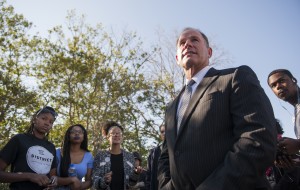
Racial strife at the University of Missouri and a call for the resignation of the school’s president caught BYU’s attention when it briefly threatened the football game between the two schools scheduled for this Saturday.
Over 30 black Missouri football players bolstered a student movement when they announced they would not participate in any team activities until the university’s president resigned, as per the demands of student activists.
Not playing the game would likely have had adverse season implications for both teams, and Missouri would have had to pay BYU $1 million for forfeiting. That scenario was alive Sunday with Missouri president Tim Wolfe refusing the calls for resignation. Things changed quickly Monday morning when Wolfe did resign, and Missouri’s athletic department tweeted out a statement saying “football activities will resume Tuesday in preparation for Saturday’s game with BYU.”
A student activist group called “Concerned Student 1950” has been in revolt for months over perceived racial injustices on the college’s campus. One of the most notorious incidents involved a swastika drawn with feces on a bathroom wall in a campus dorm, although the identity and motives of the perpetrator remain unclear. The university allegedly downplayed this incident. Frustrations were further fueled when a group of black protestors crowded and blocked Wolfe’s car at a homecoming parade on Oct. 10. Wolfe refused to get out of his car and speak to the protestors, who were later removed by police.
Protests escalated when graduate student Jonathan Butler began a hunger strike Nov. 2 that continued until Wolfe officially stepped down.
Butler’s hunger strike was highly publicized, but it was perhaps the football team that brought the issue to its tipping point and pushed Wolfe out of office.
“This is not — I repeat, not — the way change should come about,” Wolfe said in his official statement on Monday, Nov. 9, according to a CNN broadcast. “Change comes from listening, learning, caring and conversation. Use my resignation to heal and start talking again.”
Missouri Gov. Jay Nixon said in a statement in an official press release that Wolfe’s resignation was “a necessary step toward healing and reconciliation on the University of Missouri campus. There is more work to do, and now the University of Missouri must move forward, united by a commitment to excellence, and respect and tolerance for all.”
The team drew national attention to the cause when they made the announcement through a tweet Saturday night from Missouri’s Legion of Black Collegians. “We are no longer taking it,” the tweet said. “It’s time to fight.”
The tweet was accompanied by a photo of the players’ statement of protest and a photo of the players linking arms. Tiger football Head Coach Gary Pinkel tweeted that the coaching staff stood behind its players. He shared a photo of the team and coaching staff arm-in-arm.
We are no longer taking it. It’s time to fight. #ConcernedStudent1950 #MizzouHungerStrike pic.twitter.com/mnPZBviqJF
— LBC (@MizzouLBC) November 8, 2015
The Concerned Student 1950 movement references the year the first black student enrolled at the university. For several months the organization has called for the university to address racism on campus. Missouri students use the hashtag #ConcernedStudent1950 on social media to discuss the issue.
The Mizzou Family stands as one. We are united. We are behind our players. #ConcernedStudent1950 GP pic.twitter.com/fMHbPPTTKl — Coach Gary Pinkel (@GaryPinkel) November 8, 2015
However, the entire team wasn’t united in the boycott. An ESPN report on Sunday night quoted an unidentified white Missouri football player as saying, “As much as we want to say everyone is united, half the team and coaches — black and white — are pissed,” the player, who wished to remain anonymous, told ESPN. “If we were 9-0, this wouldn’t be happening.”
BYU is scheduled to play BYU Saturday, Nov. 14, in Arrowhead Stadium in Kansas City at 5:30 p.m. Mountain Time.




